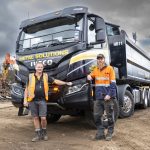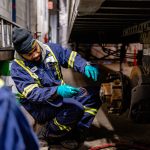Alpine and Sinotruk: Recipe for success
Alpine and Sinotruk: Recipe for success
Sinotruk, though a relative newcomer to South Africa, is rapidly expanding its market share. Durban-based Alpine Truck and Bus, the brand’s largest-selling dealer in the country, has played a crucial role in this success. CEO Bruce Dickson, with over 40 years in the commercial vehicle industry, tells NICOLA JENVEY that he’s not surprised by Sinotruk’s success.
Two years ago, Dickson saw an opportunity to get involved with Sinotruk’s Howo and Sitrak brands in South Africa. Driven by a relentless approach to business, and with Alpine Truck and Bus in partnership with a JSE-listed company and a former colleague, he approached Dubai-based global logistics giant DP World to test the Sitrak G7 air suspension. The unit was tested extensively for over nine months in various DP World operations, marking the beginning of a highly successful collaboration.
Since November 2023, Alpine has delivered about 200 trucks to DP World Sub-Saharan Africa. Dickson attributes this success to a balance of “price, quality, and world-class safety features”, offering trucks for R1.7 million, well below the R2.5 million price tag of similar European models.
DP World, which acquired Imperial Logistics in South Africa in 2022, has been an instrumental client for Alpine’s growth. Alpine has also been appointed a preferred supplier to DP World, and it will be responsible for providing heavy commercial vehicles to the company over the next three years.
Alpine also currently serves as the agent for Sinotruk’s more affordable Howo – used primarily for tipper applications – and the premium Sitrak, a competitor for major European brands. While Howo rivals Powerstar and FAW, Sitrak aims to stand alongside European heavyweights. These Chinese trucks, as Dickson notes, are “sophisticated, top-quality products, offering the most competitive fuel consumption and TCO; they are definitely not ‘cheap and nasty’”.
During a visit to Sinotruk’s facilities in China, Dickson was impressed with the quality, safety, and fuel efficiency of the trucks, highlighting features like the ZF TraXon gearbox and excellent driver performance.

“The African market wants the cheapest products; the South African one demands sophistication, residual resale value, and repair and maintenance agreements. We have worked with Sinotruk to successfully expand its local footprint,” says Dickson. Presently, trucks are imported completely built-up (CBU), but local assembly could soon follow. According to Alpine’s head of sales, Brandon Barth, the current CBU prices are already competitive, positioning Sinotruk favourably against European alternatives.
Alpine has also addressed industry-wide concerns like diesel theft. DP World requested that its trucks be equipped with Powerfleet TankSafe’s anti-siphon technology, which is now available to all Alpine customers. TankSafe’s solutions include cost-effective options for medium and heavy trucks, effectively tackling diesel siphoning issues.
Looking ahead, Alpine anticipates Sinotruk will sell around 2,000 units in South Africa next year, with a 25% share secured by Alpine. Regionally, Barth aims to sell 40 to 50 units annually in Lesotho and foresees growth in Eswatini, Zambia, and Mozambique.
Sinotruk’s “cherry on the cake” remains South Africa, a country where Chinese brands have gained significant acceptance. “South Africa’s geopolitical landscape also means it will become increasingly difficult for European brands to grow exponentially,” notes Dickson. This also positions Alpine well to capture market share from competitors like FAW.
Not surprisingly, Dickson is upbeat about prospects for the future. “In South Africa, Alpine and Sinotruk’s partnership is driving growth through competitive pricing, quality, and strategic adaptability,” he says. “By aligning with local market demands and providing European-grade features at accessible price points, we are well-positioned to capture a significant share of the commercial vehicle market.”
Published by
Focus on Transport
focusmagsa




